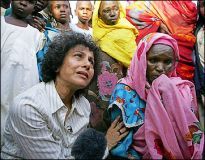Sudan failed to stop Darfur atrocities: US
WASHINGTON, Feb 28 (AFP) — Sudan’s government failed last year to stop atrocities in its western Darfur region, while Zimbabwe’s President Robert Mugabe used intimidation and violence to remain in power, the US State Department said in an annual report released.
 The State Department’s worldwide human rights report also described abuses committed against women and children in Africa’s troubled Great Lakes region amid prospects for peace to end years of strife.
The State Department’s worldwide human rights report also described abuses committed against women and children in Africa’s troubled Great Lakes region amid prospects for peace to end years of strife.
The United States has described the violence in Sudan’s strife-torn region as genocide, and the report said government militia and Khartoum-backed Janjaweed militia “routinely attacked civilian villages.”
“Despite the Government’s repeated commitments to refrain from further violence in Darfur, the atrocities continued,” the report said.
“Government forces in that region routinely killed, injured, and displaced civilians, and destroyed clinics and dwellings intentionally during offensive operations,” it said.
“There were confirmed reports that government-supported militia also intentionally attacked civilians, looted their possessions, and destroyed their villages.”
In Zimbabwe, Mugabe’s government continued to commit “numerous, serious abuses” as he and his ZANU-PF party “used intimidation and violence to maintain political power,” the report said.
“A systematic, government sanctioned campaign of violence targeting supporters and perceived supporters of the opposition continued during the year,” it said.
“Security forces, government-sanctioned youth militias, and ruling party supporters tortured, raped, and otherwise abused persons perceived to be associated with the opposition; some persons died from their injuries,” the report said.
Mugabe’s government also “promoted widespread resentment against the white minority,” it said.
In Africa’s Great Lakes region, which includes the Democratic Republic of Congo (DRC), Rwanda, Burundi and Uganda, prospects for peace are “promising” after years of violence between ethnic groups and civil war, but human rights abuses “are almost routine.”
“Children are the primary victims and are forcefully recruited, abducted, and turned into soldiers,” the report said, adding that some governments have made progress in demobilizing child soldiers.
“Women and girls are particularly vulnerable, as rape increasingly is used as a weapon of war,” it said.
Meanwhile in Ivory Coast, mired in chaos since a rebellion was launched in September 2002 in a bid to oust President Laurent Gbagbo, “There were credible reports of pro-government death squad activity, extrajudicial killings, and disappearances.”
“The rebels in the north summarily executed persons, killed numerous civilians, arbitrarily arrested and detained persons, and conducted arbitrary ad hoc justice. Mass graves were found in rebel-held territory.”
